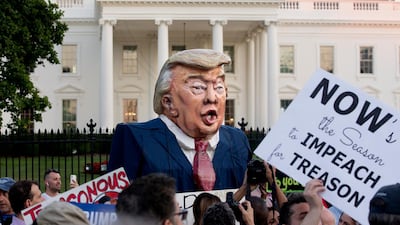Donald Trump ran for president vowing to upend the foreign policy consensus embraced by all other US presidents since World War II and forge a new path. But in the wake of the disastrous Nato meeting in Brussels and a catastrophic Helsinki summit with Russian President Vladimir Putin, "Trumpism" as an American foreign policy orientation seems effectively dead.
Mr Trump remains president and thus an unavoidable political reality, for now. Since he continues to enjoy strong support from Republican voters, the Republican majorities in both the House and Senate are fearful of challenging him.
But it's increasingly clear how fundamentally isolated Mr Trump is in his implacable hostility towards key permanent alliances, most notably Nato, that formed the bedrock of US international strategy for decades.
Many Americans, including former presidents Barack Obama and George W Bush, share Mr Trump's view that many European countries, especially Germany, don't spend enough on defence. Washington was already pushing them strongly to meet their 2 per cent defence spending goals before Mr Trump took office.
A small minority of Republican lawmakers share his far deeper scepticism of these alliances. But most Americans, left and right, remain committed to international partnerships, especially the Atlantic alliance.
Mr Trump hasn’t seriously undermined these deeply ingrained attitudes – yet. If he’s trying to prepare Americans to leave Nato, he doesn’t seem to have made much progress.
On Russia, moreover, Mr Trump is virtually alone.
After Helsinki, Trumpism no longer seems viable as a foreign policy model. Almost all Americans, other than the extreme right and left, were aghast at his capitulation to Mr Putin's agenda and world view. The collective outcry was unprecedented.
Mr Trump's whole cabinet, the entire Senate and almost all of the House (except a small, ultra-right-wing "freedom caucus" that tends towards white nationalism and follows him slavishly) plainly don't share his willingness to not just court Russia but seemingly defer to Moscow's wishes, at Washington's expense.
While there are numerous interpretations of what a Trump foreign policy orientation means, some recurring themes – military build-ups, bilateralism over multilateralism, chaos over stability, unpredictability and the predatory deployment of US economic power – are evident.
____________________________
Read more from Hussein Ibish:
Trump's Nato performance was an exercise in destruction
'America first' is quickly turning into America alone
When being a 'yes man' isn't quite what it seems
____________________________
The historian Walter Russell Mead argues that Mr Trump embodies the revival of a familiar Jacksonian tradition that was marginalised after the Second World War but never really vanished. These neo-isolationist, nationalist, militarist, mercantilist and narrowly self-serving attitudes once seemed as if they might define his outlook.
But, in practice, his policies have proved an incoherent mishmash that doesn’t reflect or promote the return of a recognisably Jacksonian vision. Neo-Jacksonianism might account for his performance in Brussels but can’t possibly explain his self-sabotaging conduct in Helsinki.
No Americans who deal seriously with foreign policy still honestly think Mr Trump’s lurching international bluster and bumbling constitute a meaningful new, renewed, or even idiosyncratic, practicable means of marshalling and applying American power.
Even among those sympathetic to him, serious doubts emerged after the Singapore summit with Kim Jong-un and greatly intensified during the Nato meeting. Following Helsinki, that conversation is effectively over.
This escalating succession of debacles has destroyed whatever foreign policy credibility Mr Trump had left. His most loyal supporters tried to dismiss Helsinki as a mere “embarrassment”, ill-chosen words without practical implications. Virtually no one is convinced.
Some successor could yet try to use popular sentiments to attempt to realise Mr Trump’s missed opportunity and revive a neo-isolationist US foreign policy. Since the end of the Cold War, Americans have signalled a preference for less international engagement.
Electing Bill Clinton over George Bush, George W Bush over Al Gore, Barack Obama over John McCain and Mr Trump over Hillary Clinton, they consistently empowered the candidate who advocated a reduced global burden and renewed focus on domestic concerns. The American public clearly hasn’t been persuaded it’s in their interests to maintain a leading international role.
Efforts to systematically analyse Mr Trump’s foreign policy approach will continue. But unless he wins a second term – and perhaps even then – they’re irrelevant to the longer arc of US policy. No one will follow Mr Trump’s lead because it’s fundamentally incomprehensible and, especially, surrenders US power more than leverages it.
Disputes about why Mr Trump consistently sides with Russian over US interests and Mr Putin over his own officials are politically crucial but irrelevant to policy.
Mr Trump remains popular among those who view him as a party – and especially a tribal, white, Christian – leader. But his credibility in foreign policy circles, even among those closest to him, although they won’t admit it, has been sunk. Unless he secures a major historic achievement to offset these ever-increasing debacles, he can’t be the gravitational centre of a new orientation.
Mr Trump remains a political fact. But as a foreign policy concept, he’s effectively finished.
Unless a successor picks up the neo-isolationist, Jacksonian ball he’s dropped and runs with it effectively – for which there would be a significant constituency – post-Trump Washington will undoubtedly try to return, as quickly as possible, to the multilateral, rules-based and stability-seeking policies of the past and, as far as possible, undo the profound damage Mr Trump continues to wreak.
Hussein Ibish is a senior resident scholar at the Arab Gulf States Institute in Washington


